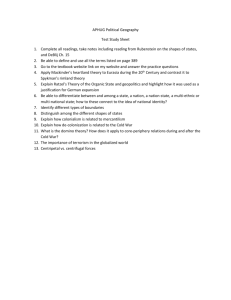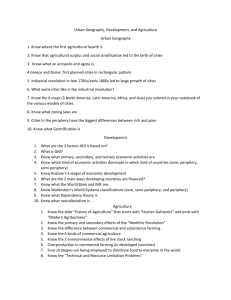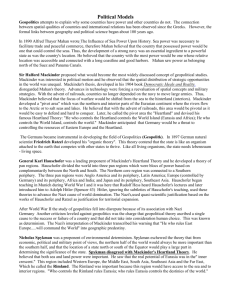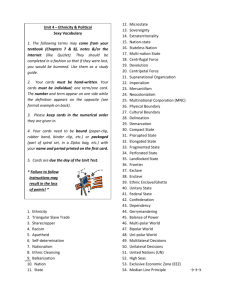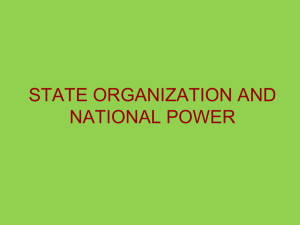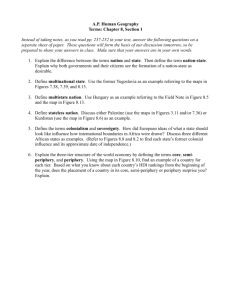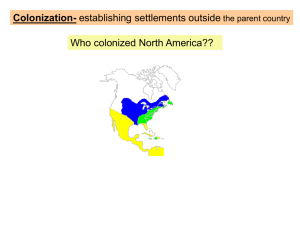File
advertisement
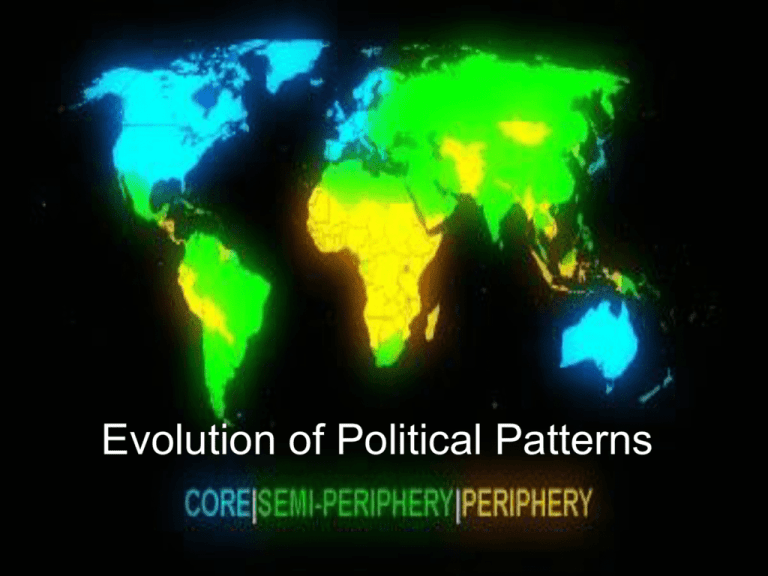
Evolution of Political Patterns Colonialism 101 • Colonialism: Defined as the control of one state over another area or people – First wave: 15th century (European explorers such as Columbus) – Second wave: 16th century (European nation begins building world empires competing for territory) • Rationale: 1.Extract raw materials from colonized area to export home (Mercantilism) 2. Enables mother country to produce more products and obtain wealth 3. Spread Christianity Effects of Colonialism within Geo-Politics • Fueled Imperialism: the process of establishing political, social and economic dominance over the colonized area – Assimilation/Acculturation of indigenous people • Christianity and European culture dominant – Destroyed indigenous landscapes, imposing European architecture – Created “dependence” of colonized area on colonizer BBalkanization and Devolution • Balkanization: Political term that refers to the fragmentation of a region or country into smaller regions or countries – i.e. Yugoslavia • http://www.harpercollege.edu/mhealy/g101ilec/intro/clt/clt con/cltconfr.htm • Case Study – Yugoslavia: http://www.newworldencyclopedia.org/entry/Yugoslavia • Devolution: The decentralization of a government from a unitary to a federal system or a fracturing of a government such as Balkanization Dependency Theory and Neocolonialism • Dependency Theory: poor countries are poor today because of being colonized long ago. • Ex.'s: South America, Africa, Asia are still “dependent” on former colonizers • Basic services and infrastructure were never established in colonized lands. • Former colonies are now in dept to former colonizer • Neocolonialism: Continued dependence of new states on former colonizers Neocolonialism and Wallerstein's World-Systems Analysis • Wallerstein asserts: the situation in one country is directly linked to that country’s role in a capitalistic system • What is a “capitalistic” system? • Neocolonialism is an effect of a poor country’s relationship to a global economy • Dependency of poor countries on former colonies hinders economic growth • Wallerstein’s three-tier structure in the World-System: – Refer to pages 251 (Map of structure) and 327-328 (economic development) – Core: industrialized, developed countries, help drive global economy – Periphery: underdeveloped, former colonies – Semi-Periphery: former colonies, yet with characteristics of both core and periphery Geopolitical Theorists Friedrich Ratzel, Halford Mackinder, Nicolas Spykman • Friedrich Ratzel: Organic Theory (19th century) – States are living organisms – States hunger for land and resources – Like organisms, states want to grow larger by acquiring land – Hitler used Ratzel’s theory justifying his lust for more land Mackinder’s Heartland • • • • • Theory developed as sea power was ending Theory asserts: control over land is vital Eurasia is “world island” He who controls Eurasia controls the world Theory linked to communists'’ efforts to dominate eastern Europe and to U.S. “containment” policy Spykman’s Rimland • Rimland is Eurasia’s periphery – not core of Russia and Central Asia • Periphery = western Europe and Southeast, South, and East Asia • Theory linked to Vietnam and Korean Wars: wars against spread of Communism into peripheral rimland Martha Sharma Vocab List • http://apcentral.collegeboard.com/apc/me mbers/courses/teachers_corner/49389.ht ml
